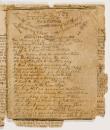While many stories about the life of Frank MacNamara may be attributed to folklore, most biographical details are verifiable by historical records. Some of these show that he was convicted on a charge of larceny, but lines in the satire, 'A Dialogue Between Two Hibernians', suggest that he may have been a political agitator too and a member of one of the Irish Ribbon secret societies (the 'Ribbon' name derived from the badges worn by their members), probably the Whiteboys.
MacNamara was convicted on 15 January 1832, sentenced to seven years' transportation and sailed from Cork on the 'Eliza' on 10 May 1832. He was constantly rebellious in the colony of New South Wales (NSW) and served at least fifteen years, experiencing the brutality of the convict system at its worst: repeated floggings, solitary confinement, hard labour, treadmill, leg irons and chains. He was renowned as a composer of impertinent, improvised verse; and apart from the epigrams, longer poems have survived, such as 'A Convict's Tour of Hell' (1839), composed while MacNamara was employed as a shepherd with the Australian Agricultural Company. The poem is an anti-authoritarian satire that has become part of Australia's oral tradition and one of four contained in a notebook presented to the Mitchell Library (Sydney) in 1958 by Mrs R. C. Trimingham of Northbridge, NSW, from the estate of her late father, Earnest Cameron.
In 1842, MacNamara was sent to Port Arthur, where he was granted a ticket of leave in 1847 and his certificate of freedom in 1849. His movements after leaving Tasmania (previously Van Diemen's Land) are uncertain, although John Meredith and Rex Whalan (qq.v.) in Frank the Poet: The Life and Works of Francis MacNamara (1979), who first linked 'Frank the Poet' with the Francis MacNamara transported in 1832, suggest that he may have been 'the Poet', a balladeer living in a Melbourne doss-house whom Marcus Clarke (q.v.) wrote about in an account of life in the back alleys of Melbourne (1868). Meredith and Whalan have identified three main influences apparent in Frank the Poet's work: the Irish ballad-makers, Jonathan Swift and Robert Burns. In The Turning Wave: Poems and Songs of Irish Australia (2001), Colleen Burke and Vincent Woods (qq.v.) claim that MacNamara was 'the most significant voice of all the thousands of Irish convicts who were transported to Australia' (p.292).
 364111539997698537.jpg
364111539997698537.jpg